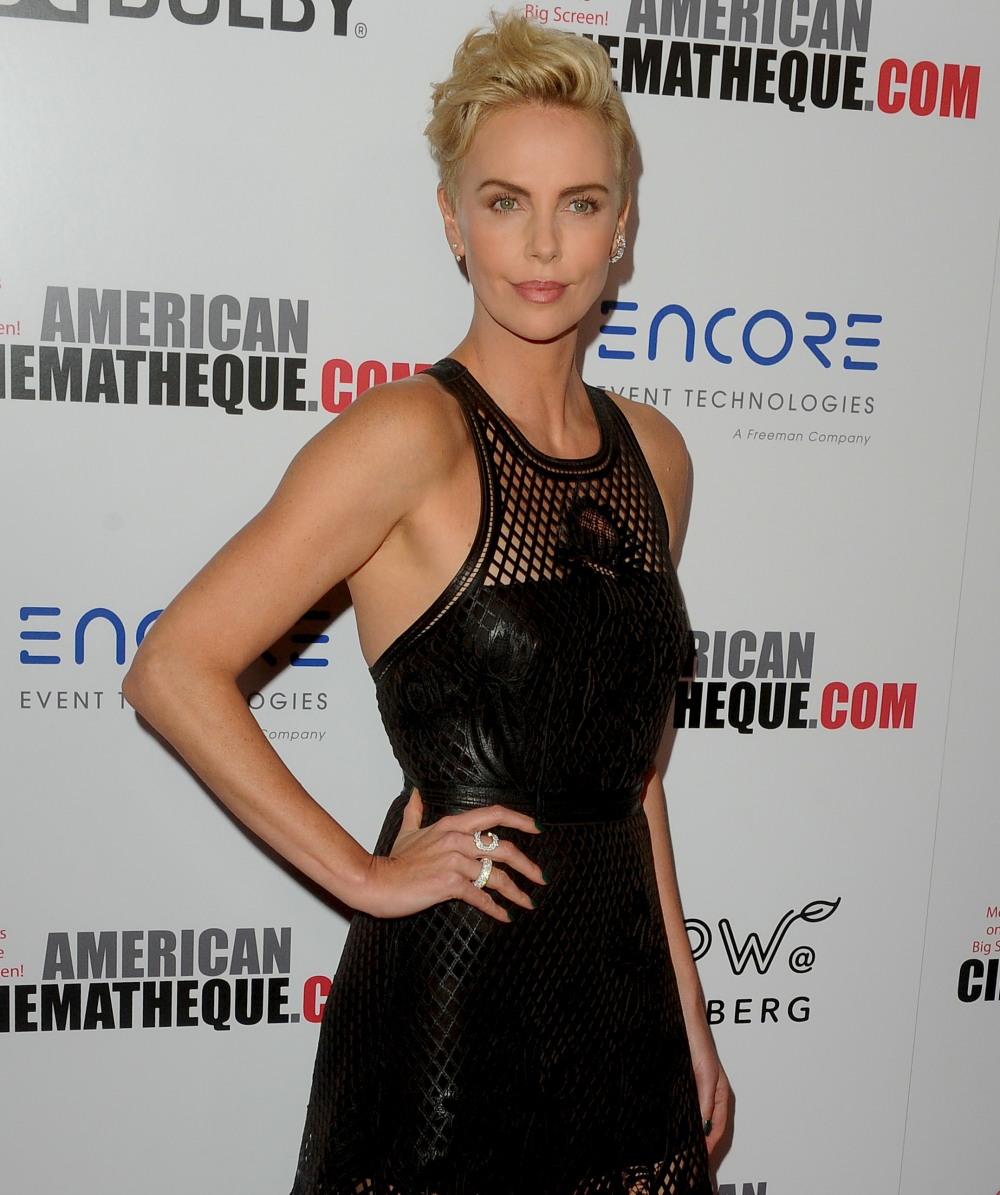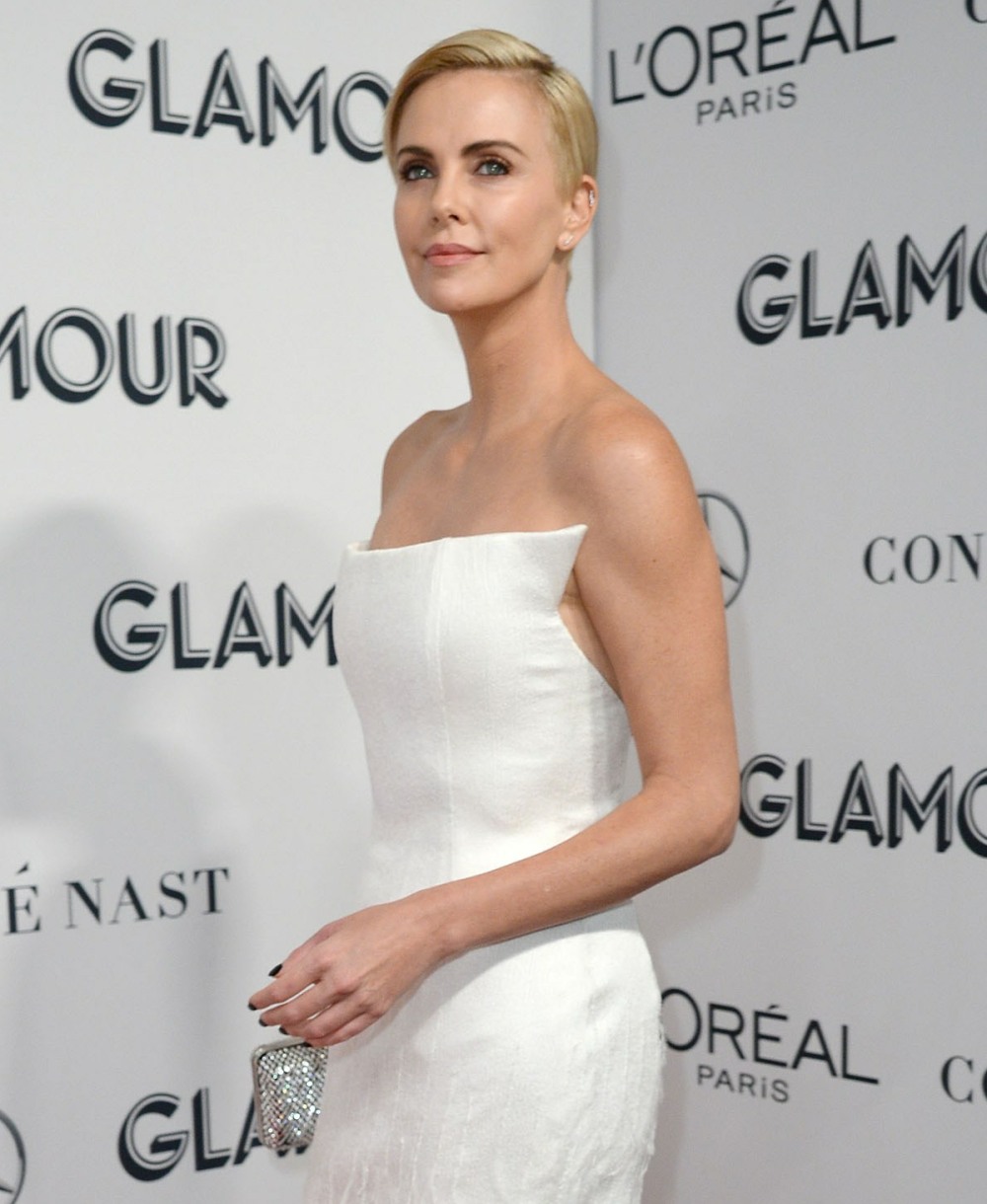Charlize Theron has been doing the bulk of the Bombshell promotion for the past month or two. Nicole Kidman has given some interviews too, but where is Margot Robbie? And John Lithgow too, where is he? Charlize is front and center because she plays Megyn Kelly, and Charlize is the lead AND the producer. All of which means, she sat down for a long interview with NPR and there are SO MANY good quotes from this interview. Charlize spoke at length about growing up under apartheid in South Africa, and how it took years and lots of therapy for her to really work out the feeling of guilt because of her specific privilege and the system of white privilege in South Africa. Charlize also spoke about how her mother killed her father, and how a director sexually harassed her in 1994.
She was sexually harassed: In 1994, actor Charlize Theron was just starting out in show business when a famous director invited her to an audition at his home. When she showed up, she found the director drinking and in his pajamas. He touched her leg; she apologized and left in a hurry. Driving away, Theron became angry — with herself: “I just kept hitting the steering wheel. I put a lot of blame on myself … that I didn’t say all the right things, and that I didn’t tell him to take a hike, and that I didn’t do all of those things that we so want to believe we’ll do in those situations.”
She eventually confronted her harasser: “In sexual harassment, you’re always waiting for that moment where there’s full closure, where you feel like you’ve actually … had your moment, where you get to say your piece. And that never really happens. I’ve heard this repeatedly in hearing other women’s stories, and that is the unfortunate thing about sexual harassment. You never get that moment where you feel like the tables are reversed and now he’s finally getting it.
She has disclosed her harasser’s name but no one has ever published it: “I actually did disclose his name. You don’t know that because every time I disclosed his name, the journalist made the decision to not write his name, and it goes to show just how deeply systemic this problem is. I remember the first time somebody asked me if I ever had a casting couch experience, and I openly shared the experience and named him, and the person decided to not write his name. So the story is out, and strangely, when the Harvey Weinstein story broke, I, for the first time ever, Googled the story and the story came up everywhere. It popped up everywhere, and nowhere could you find this guy’s name. And it was incredibly upsetting to me… I don’t have a desire to protect him, but I also don’t want him to overshadow this film right now. So there will be a right time where I will talk about this again, and I will say his name, yes.
The “gray area” of sexual harassment: “It’s not always physical assault. It’s not always rape. There’s a psychological damage that happens for women in the everyday casualness of language, touch or threat — threat of losing your job. Those are things I’ve definitely encountered.”
On her mother killing her father in self-defense: “My father was a very sick man. My father was an alcoholic all my life. I only knew him one way, and that was as an alcoholic. … It was a pretty hopeless situation. Our family was just kind of stuck in it. And the day-to-day unpredictability of living with an addict is the thing that you sit with and have kind of embedded in your body for the rest of your life, more than just this one event of what happened one night. I think our family was an incredibly unhealthy one. And all of it, I think, scarred us in a way… My father was so drunk that he shouldn’t have been able to walk when he came into the house with a gun. My mom and I were in my bedroom leaning against the door, because he was trying to push through the door. So both of us were leaning against the door from the inside to have him not be able to push through. He took a step back and just shot through the door three times. None of those bullets ever hit us, which is just a miracle. But in self-defense, she ended the threat.”
I’ve always wondered about Charlize’s family background, but specifically to that moment of her mother killing her father in self-defense, and how that must have fundamentally changed everything in Charlize’s life. But I appreciate the way she frames it here: “And the day-to-day unpredictability of living with an addict is the thing that you sit with and have kind of embedded in your body for the rest of your life, more than just this one event of what happened one night.” As much as the violence of that night had larger repercussions in her life, it was the day-to-day life with an alcoholic parent which really f–ked her up. That’s an incredible observation.
Also: I think it’s really interesting that Charlize has apparently named her harasser to journalists and the media outlets choose not to run with it. I hope she does eventually name him. For some reason, I looked up Michael Bay’s IMDB. But… maybe it’s not Bay. A perv director in the ‘90s? Hm.
Photos courtesy of WENN.















Learning this history about her, it absolutely baffles me that she was ever involved with Sean Penn, notorious abuser. I guess it can boil down to humans are complicated, and abusers are manipulative.
It’s not baffling to me. Abusers can be charming to the point you let your guard down when you’d normally keep them up. People who have a history with abuse can partner with abusers even when red flags are present not just from being manipulated but also because the abusive behavior is familiar
It’s not baffling to me. Abusers can be charming to the point you let your guard down when you’d normally keep them up. People who have a history with abuse can partner with abusers even when red flags are present not just from being manipulated but also because the abusive behavior is familiar.
Also remember, she ghosted Penn’s ass and now refuses to acknowledge her time with him.
Unfortunately I think it’s pretty common, especially for some kids who grow up in an abusive situation and don’t have healthy examples to learn from. And given how she just up and ghosted him one day, maybe he wasn’t abusive in the beginning, but then something happened and she got outta there.
I don’t know that I’ve ever heard the specifics of what happened with her parents. That had to have been utterly terrifying. She has really been through some tough stuff.
It’s infuriating the journalists keep omitting the director’s name, when she’s been willing to name him repeatedly. I kind of wish she’d just said it in this interview, if only to warn others. Maybe he’s not working much these days.
I wish she had challenged this interviewer with a question like “if I name him now, will you print it?” just to see how the interviewer answered.
It’s also not uncommon for people from abusive homes tone up with assholes a couple times. If your father drank, beat, and shot at you and your mom….well, you aren’t going to be as alarmed by someone who ‘just’ drinks, cusses, and throws things like someone from a nonviolent childhood. Your standards are a bit warped.
Theron has always bothered me a bit when it comes to her PR image. I think she plays her own games. Why not name the guy right then in the NPR interview. I’m not buying her excuse. Name him again and again but especially name him on live radio. Come on! Also, when she first hit Hollywood there were several articles about her family history that brought up that the police actually thought that Theron had pulled the trigger and that her mother was protecting her — as most mother’s would — especially due to her age, her mother’s own guilt in staying in the relationship. A reference to her father sexually coming at her was also mentioned in these articles and that both Theron and her mother said one thing at scene and then totally changed their stories and have stuck to them ever since. Now the story s always, that the mother fired the gun, but I know I read the other stories years ago because I remember thinking a lot about how awful it was for both of them and what I would have done in a similar situation.
It sounds like you are trying to re-litigate her father’s murder. I hope that is not the case.
“when she first hit Hollywood there were several articles about her family history that brought up that the police actually thought that Theron had pulled the trigger and that her mother was protecting her ”
And…so what if she did?
The guy was violent, drunk and coming at them with a gun. In the end, does it matter all that much which woman actually pulled the trigger?
She don’t owe you nothing.
I’ve always found Charlize to be a fantastic actress yet there is something off about her. When I say off I don’t mean it to be a necessary awful thing either b/c no one is normal. Normal doesn’t exist actually.
The woman has been through a lot and has/is dealing w/ her mental health issues plus she clearly feels some way about white privilege which is actually great a white woman acknowledges this as a problem. I just hope she still sees a therapist and is talking things through.
“So there will be a right time where I will talk about this again, and I will say his name, yes.”
I thought that was a particularly powerful line.
I also really resonate with the part quoted about the day-to-day effects of living with an alcoholic. It put my own responses into perspective for me. Even though I’ve tried to actively heal, there are still ways it keeps affecting you decades later.